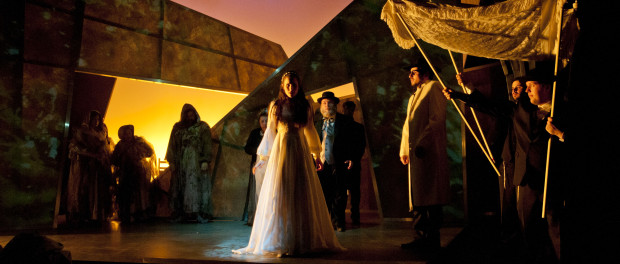The Dybbuk: A Haunting Yiddish Tale On Love & Exorcism
According Jewish folklore, dybbuk are lost souls of the deceased who possess the living in order to force humans to bring their consciousness to rest. Whilst exorcism has never been an important part of the Jewish religion, one of today’s most pivotal works of Yiddish literature is completely impregnated with the thematic of demon possession. Written between 1913 and 1916 by Russian Jewish playwright S. Ansky, The Dybbuk is a gripping tale that weaves the supernatural into love, religion into the supernatural, honour into religion… Thus, a century after the play’s conception, the Dora Wasserman Yiddish Theatre presents Montreal audiences with a modern rendition of this legendary drama, while remaining true to its quintessential Yiddish dialogue. Running from August 9th to the 27th at the Segal Centre for Performing Arts, The Dybbuk, despite some minor production flaws, dazzled me with its cultural authenticity and interesting exploitation of a very dark side of Jewish folklore.
Here comes the tragic story of Khonen and Laya’s betrothal, promised to each other in marriage by their fathers before either child was born. However, when Khonen is orphaned, the only remaining keeper of the nuptial oath – Laya’s father – conveniently forgets about it to marry his daughter off to a man of wealth. Ironically enough, Laya and Khonen are actually dreadfully in love with each other – the Yeshiva student having won the girl over by some terribly pretentious Talmudic spiel. When a dire accident brings about Khonen’s death, a dybbuk possesses the young, frightened maiden to remind her father of the promise that was not kept…
Despite the dialogue being in Yiddish – a completely unintelligible language for anyone as unfamiliar with it as I am – the Segal Center projected incredibly clear, well-timed and don’t-you-forget bilingual subtitles, straight above the stage area. Unfortunately, I felt so compelled to read every single word off of the translation panel that I missed a lot of what was happening on the actual stage. At least, the Yiddish really gave cultural credibility of the play. Various Jewish customs were further emphasized by the klezmer soundtrack, Jewish nuptial dances and the costume design – beards, shtreimel and kipas galore. Whilst the women cooked and served dinner, the men spent lots of philosophical hours discussing all of the useless subtleties of the Torah… 70% of the script treaded upon the traditional themes of arranged marriage and matchmaking, often interrupted by humorous Jewish anecdotes and lessons of wisdom.
The only aspect of the play that truly set me off was the very contemporary minimalism of the set design. Picture three giant flat-surfaced triangles, upon the façade of which play various light projections… As strategic and multi-functional as projectors may be, they often make set designers seem too lazy to have invested an effort into truly artistically stimulating props and backgrounds. My negative impression may simply derive from a personal dislike of the trendy minimalist settings prevalent in many modern renditions of classic operas, ballets and plays. When one is adapting a traditional and illustrious work of performing arts, minimalism simply feel completely inadequate.
Nevertheless, the actual production of The Dybbuk was quite solid. A lot of the choreographies utterly stunned me and the minimalist background even helped emphasize them. When a group of beggars performed an entrancingly sinister dance full of ritualistic darkness, the viewer could really sense a certain foreshadowing to Khonen’s spiritual resurrection… And Khonen and Laya’s tragically sad waltz stirred viewers to perfection. Despite a lack of props and physical ressources, the demon possession was also on point. Shauna Bonaduce (Laya) skilfully transitioned from a virginally innocent maiden to a demonically possessed bombshell. The girl’s spiritual upheaval was theatrically highlighted by Khonen’s voice being eerily dubbed over Laya’s.
Many messages can be retained from the tragic story of The Dybbuk. For starters, it vaguely brushes over the perpetually troubling theological question of the nature of evil, by incorporating a whole world of dark spirituality. It was interesting to see how the very dated romance – involving pretty much what can be defined as love at first sight – teaches audience members that the best way to court a girl is by showing off one’s extensive Talmudic knowledge. And this neat story on exorcism really illustrates the best technique to stalling a terribly inconvenient arranged marriage: demon possession.
Rating: *** 1/2
Best Quote: “I should like to tell you a parable. One time, there came before the rabbi a rich man, but also an accomplished miser; they often go together. The rabbi took the thrifty man by the hand, took him to a window and said,’Look.’ The rich man looked out on the street, and the rabbi said, ‘What do you see?’ And the rich man said, ‘I see people.’ Again the rabbi took him by the hand and led him to a mirror, and said, ‘What do you see now?’ And the rich man said, ‘I see myself.’ But now the rabbi said to him, ‘Pay attention. The window was glass, and then the mirror was glass. But the glass of the mirror is silvered. And as soon as it is silvered, you stop seeing people and you see only yourself.'”
See the Dybbuk August 24 and August 27 at the Segal Centre. $24.50+









